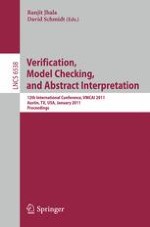This book constitutes the refereed proceedings of the 12th International Conference on Verification, Model Checking, and Abstract Interpretation, VMCAI 2011, held in Austin, TX, USA, in January 2011, co-located with the Symposium on Principles of Programming Languages, POPL 2011. The 24 revised full papers presented together with 4 invited talks were carefully reviewed and selected from 71 initial submissions. The papers showcases state-of-the-art research in areas such as verification, model checking, abstract interpretation and address any programming paradigm, including concurrent, constraint, functional, imperative, logic and object-oriented programming. Further topics covered are static analysis, deductive methods, program certification, debugging techniques, abstract domains, type systems, and optimization.
